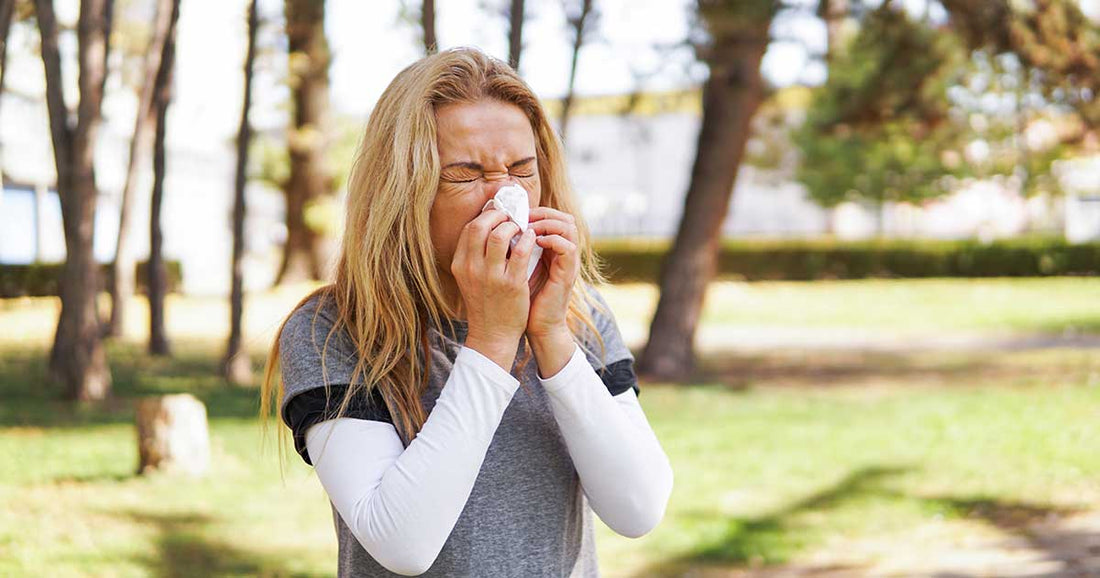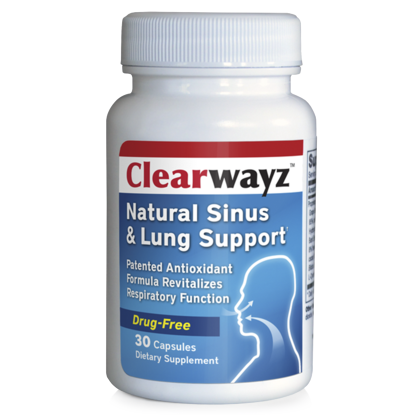Seasonal Allergies 101: Dealing With Spring and Summer Allergies

Share
As we approach Spring, it’s time to prepare for spring and summer allergies. In this article, we’ll discuss the top causes of both spring and summer allergies along with their symptoms. We’ll also list the best ways to protect yourself from allergies and the top all-natural allergy relief supplements.
Top Allergy Symptoms
Also known as “allergic rhinitis,” seasonal allergies occur when the body’s immune system overreacts to mold, pollen, spores, or other outdoor stimulants. According to the American College of Allergy, Asthma, and Immunology, nearly 27.2% of U.S. children and 31% of adults exhibited allergy symptoms in 2021.
There are many common symptoms of seasonal allergies:
- Coughing
- Fatigue
- Headache
- Sore throat
- Sinus pressure around the nose and cheeks
- Stuffy nose and congestion
- Itchy eyes and throat
Knowing the various symptoms of seasonal allergies is key to implementing the proper treatment.
Top Causes of Seasonal Allergies
There are several primary causes of seasonal allergies. Here are the most common:
Spring Allergies
Pollen, which comes from grasses, trees, and weeds, is the primary cause of spring allergies. When pollen gets into a person’s nose, the immune system perceives it as a threat, prompting the body to release histamines to attack the allergens. These histamines cause the itchy nose and watery eyes seen with allergies.
Pollen can travel in the air for miles, especially on windy days. The following are a few of the trees, weeds, and grasses most likely to release pollen that trigger allergies:
|
Top Spring Allergy Triggers: Trees |
Top Spring Allergy Triggers: Weeds and Grasses |
|
Cedar |
Orchard |
|
Beech |
Redtop |
|
Alder |
Fescue |
|
Elm |
Perennial rye |
|
Cypress |
Sweet vernal |
|
Oak |
Johnson |
|
Palm |
June |
|
Maple |
Saltgrass |
|
Juniper |
Timothy |
|
Willow |
Bermuda |
Summer Allergies
In the summer, grass and weeds are the primary culprits that trigger allergies, with grass pollen being the largest culprit, according to Yale Medicine.
The following are the most common summer allergy triggers.
|
Summer Allergy Triggers: Grasses |
Top Summer Allergy Triggers: Weeds |
|
Orchard |
Ragweed |
|
Rye |
Pigweed |
|
Blue grasses |
Sagebrush and mugwort |
|
Bermuda |
Burning bush |
|
Timothy |
Tumbleweed |
|
Fescue |
Russian thistle |
Severity of Seasonal Allergies
Allergic rhinitis can be broken down into 3 categories: mild, moderate, and severe. In each instance, symptoms can be intermittent or persistent:[1]
-
Intermittent. Duration is less than 4 days per week or less than a month per year.
- Persistent. Symptoms occur more than 4 days per week and more than 1 month per year.
Note: These cases of seasonal allergies may be mild, where the quality of life is not heavily impacted. This includes work/school, sleep, and other daily activities. In severe cases, the quality of life is disrupted, and medical attention may be needed.
Allergy and Sinusitis: Is There a Correlation?
Studies indicate allergy symptoms may lead to sinus obstruction in some patients. A blockage of sinuses with poor drainage could cause bacterial infection, which might eventually lead to sinusitis.
In addition, preliminary studies indicate individuals with allergy symptoms may have a sinusitis rate 3.1 times higher than those without allergy symptoms. However, researchers note the incidence of sinusitis was significantly reduced in those sensitized to ragweed, Bermuda grass, oak, birch, and other trees, grasses, and weeds.[2] Additional studies are being conducted to discover correlations between the two health issues.
Treating Seasonal Allergies (Lifestyle Solutions)
One of the easiest ways to treat seasonal allergies is to decrease or limit your exposure to those allergens:
- Remove allergens by changing clothes and showering immediately after coming inside
- Use air conditioning in your home and car
- Stay indoors if the pollen count is too high or on dry, windy days
- At night, close windows and doors
- Wash bedding in hot water weekly
- Wash children’s stuffed toys weekly
- Reduce excess moisture with a dehumidifier
- Vacuum carpets weekly or remove them altogether
- Wear a hat when outdoors to limit pollen in hair
- Wash hair more frequently to remove pollen
To track pollen levels in your area with an interactive map, click HERE.
Best and Worst Foods for Seasonal Allergies
Diet can also play a key role in treating seasonal allergies. Some healthy foods contain histamine, a natural part of the body’s immune response. Histamines help the body remove pathogens or other foreign objects via sneezing, tearing up, or other methods typically seen with allergies.
Foods containing histamine can throw the body’s histamine levels out of balance during allergy season, worsening allergy symptoms. Here are some of the best foods to eat during allergy season and the foods to avoid:
|
Best Foods for Seasonal Allergies |
Worst Foods for Seasonal Allergies |
|
Onions |
Smoked meats |
|
Turmeric |
Donuts |
|
Watercress |
Lemons |
|
Parsley |
Peanuts |
|
Broccoli |
Vinegar |
|
Blueberries |
Spinach |
|
Apples |
Tomato |
|
Green tea |
Egg plant |
|
Honey (local, unfiltered, organic) |
Mature cheeses |
Seasonal Allergy Supplements
In addition to the tips listed above, consider the following all-natural supplements to treat seasonal allergy symptoms.
GlutaStat NS™ Nasal Spray Mist 
GlutaStat NS™ Nasal Spray Mist is a nasal spray designed to support the sinuses, lungs, and upper respiratory tract. This all-natural product offers the following benefits:
- Helps reduce rhinorrhea (runny nose) and sneezing
- Contains sage, bay leaves, oregano, clove, and other herbs for their antimicrobial effects
- Eases symptoms from sinusitis, bronchitis and other respiratory disorders
Clearwayz 
Clearwayz is a fast-acting formula that works with the body to support a healthy sinus, immune, and respiratory function, which can help people breathe more easily. This product is all-natural, containing a unique combination of amino acids and antioxidants that help reduce the free radicals that promote inflammation while supporting the body’s natural immune response to allergens.
Healing Support 
Healing Support Not only helps to ease symptoms associated with an irritated throat, nose, or sinus congestion but can also assist with fever, chills, and gastrointestinal discomfort. This can be vital for those suffering from more severe allergies or health issues that stem from problems with allergies.
Summary
As we enter spring and summer allergy season, we must start preparing now. By knowing what can trigger allergies, we can reduce our risk and exposure to them. How do you prepare for allergy season? Share your tips here!
References:
- Andrzej Emeryk, Justyna Emeryk-Maksymiuk, Kamil Janeczek. New guidelines for the treatment of seasonal allergic rhinitis. Postepy Dermatol Alergol. 2019 Jun; 36(3): 255–260. Published online 2019 Jun 18. doi: 10.5114/ada.2018.75749. [PMID: 31333340].https://www.ncbi.nlm.nih.gov/pmc/articles/PMC6640027/
- Song Li,Chu-Jin Zhao, Hong-Li Hua, (et al). The association between allergy and sinusitis: a cross-sectional study based on NHANES. Allergy Asthma Clin Immunol. 2021; 17: 135. Published online 2021 Dec 25. doi: 10.1186/s13223-021-00642-2. [PMID: 34953489]. https://www.ncbi.nlm.nih.gov/pmc/articles/PMC8710243/
